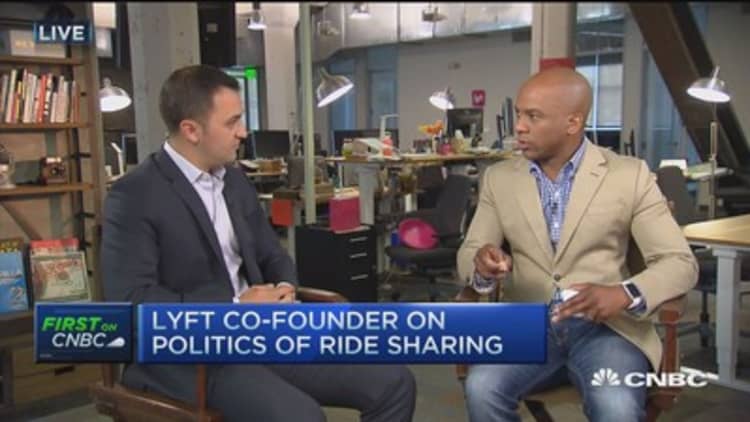
Many politicians argue that drivers for ridesharing companies like Uber and Lyft who are currently considered independent contractors should be reclassified as employees. Lyft co-founder John Zimmer is open to another way, a new category of employment that would resolve the debate.
"It could make sense to have a third way," Zimmer told CNBC on Tuesday.
"Right now, to us, it's pretty clear where these individuals fall," Zimmer said. "We're excited to be part of the future of work. ... A dialogue about a third way is fine with us."
Read More Meet the 2015 CNBC Disruptor 50 companies
Zimmer spoke with CNBC on the same day that Uber was holding a rally in New York to fight back against Mayor Bill de Blasio's proposal for a cap on private car company fleet growth to 1 percent a year after they reach 500 cars.
De Blasio cited such issues as increased congestion and pollution for his proposals, which also would include a traffic study to be completed in the next year showing the impact of ridesharing companies.
"There are already many more Uber vehicles than there are Yellow taxis in New York City, and that's just happened in a few years' time," he said at a news conference on July 20. "There's a lot of open questions here that have to be addressed. The logical thing to do in these situations is for government to say, we have to have some rules here, and some regulation."
Where Uber and Lyft agree
Though Uber and Lyft disagree on much and in the past have engaged in legal action against each other, Zimmer said blaming environmental and traffic issues on ridesharing services makes no sense.
"Think back to why we started the company. We started with the premise 80 percent of seats on the road are empty. We launched to get more people in cars," Zimmer said. In San Francisco, more than half the rides handled by Lyft are through its Lyft Line service, which doubles up on passengers in one car, essentially taking cars off the road, Zimmer said.
Speaking specifically to the New York City battle, Zimmer said, "The other thing I'm concerned about in New York is that ... when you get in a political discourse you can often lose track of maybe what the potential result of what you're doing is and here there is a lot of political back and forth between [a] few different parties and the risk is that they do something that hurts consumers and drivers, and so we're going to make sure we do everything we can to stop that."
On Tuesday, Uber kicked off its planned six-stop, citywide jobs tour in Long Island City, New York, where several hundred Uber drivers and New Yorkers interested in becoming drivers gathered. Uber New York general manager Josh Mohrer told those at the rally, "Uber drivers, you are our customers, and we are here to serve you."
Read More
Currently, Uber has approximately 26,000 active drivers and 18,000 registered vehicles in New York, which represents about 16 percent of the company's driver force. Uber claims that if the New York City bill passes, it would significantly hurt job growth and cost New York nearly 10,000 jobs.
"The legislation is wrong. Putting a cap is capping economic opportunities," said New York State Assemblyman Michael Blake, who represents the 79th District in the Bronx. "It's capping your opportunities."
Uber driver Moises Abrego from Queens, New York, who was featured in a recent Uber television ad, said at the rally, "I want to thank Uber for the opportunity I got to keep my life afloat. I lost my job a year and a half ago. There were no more jobs for me. … Uber saved my life."
Brooklyn Borough President Eric Adams noted that Uber and the New York City Council need to come to a resolution that would correctly regulate the industry without stopping Uber's growth. "Protecting the right to provide for your families is something to fight for," Adams said.
Uber's near-$50 billion valuation receives most of the press—and backlash against ridesharing—but Zimmer pointed out that Lyft is the fastest growing ridesharing company in the U.S., outpacing even Uber, which has focused on international expansion as well.
"Scale is important ... but scale doesn't mean everything," Zimmer said.
Read MoreBillion-dollar unicorns you don't know
The Lyft co-founder likened ridesharing to phone carriers like Verizon and AT&T. "You need a certain amount of coverage before you will use one carrier or the other. We need a three-minute ETA in whatever market," Zimmer said.
In San Francisco, its ETA is down to two minutes; in Los Angeles is it 2½ minutes; and in New York, where Lyft is a recent entrant, it's still at three minutes.
"Eighty percent of our rides and we believe 80 percent of the rides in the industry are happening within 20 cities, and so getting the scale in those 20 cities is incredibly important," Zimmer said. "In the last year alone we raised a billion dollars to make sure that we do that. Once you hit two minutes, there are diminishing returns and so this is a physical real world product, this transportation; it's not a social network that you can have with infinite friend connections. ... It'll start in the larger cities, then it'll go everywhere," he said.
—By Andrew Wood, Special to CNBC.com, additional reporting by Krysia Lenzo





